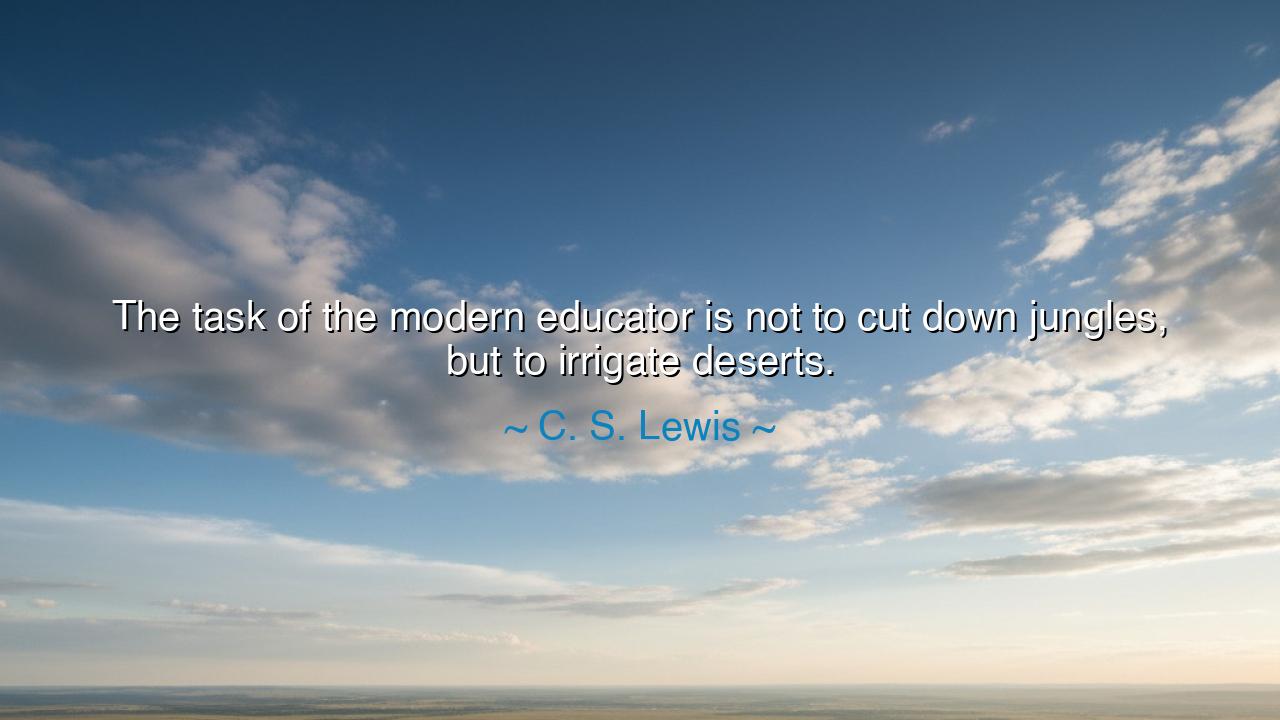
The task of the modern educator is not to cut down jungles, but






Hearken, seekers of wisdom, to the words of C. S. Lewis, who spoke with clarity and vision: "The task of the modern educator is not to cut down jungles, but to irrigate deserts." In this metaphor lies a profound meditation on the true purpose of teaching, the nurturing of minds and souls, and the cultivation of fertile ground where none seems to exist. Lewis calls upon educators to act as guides and cultivators, not destroyers, fostering growth in places of barrenness rather than imposing order upon nature’s wild abundance.
The first revelation is the distinction between destruction and cultivation. To cut down jungles is to impose control, to force clarity upon what is already abundant, perhaps overwhelming and chaotic, yet alive with life. To irrigate deserts is to recognize potential where it seems absent, to bring water, knowledge, and nourishment to the arid fields of the mind. The educator’s task, therefore, is one of subtlety, patience, and vision—to awaken life where it slumbers, rather than prune what is already vigorous.
History offers many reflections of this truth. Consider Maria Montessori, who pioneered her educational method by observing children not to suppress their natural curiosity, but to nourish their latent capacities. In schools where young minds were neglected or stifled, she brought attention, guidance, and materials that allowed the dormant potential to flourish. Montessori did not destroy the exuberance of the child’s imagination; she irrigated the desert of neglect, and the harvest was brilliance, confidence, and creativity that continues to shape generations.
Lewis’ metaphor also speaks to the heart of human growth. Each mind carries deserts—areas of doubt, neglect, or ignorance. The modern educator, like a skilled gardener, brings knowledge, encouragement, and challenge to these barren spaces. By recognizing the latent thirst for understanding and the hidden capacity for wonder, the teacher fosters growth that is both enduring and liberating, rather than imposing knowledge where curiosity already thrives.
Consider the life of Frederick Douglass, who, in a world that sought to deny him literacy and learning, encountered teachers who patiently nurtured his hunger for knowledge. Their guidance did not suppress his spirit; it irrigated the deserts of oppression, allowing his mind to blossom into eloquence, vision, and leadership. Through this, he transformed not only himself but the world, demonstrating the immense power of cultivation over destruction.
Lewis’ words also carry a call to humility and discernment for educators. One must not dominate, coerce, or impose personal will; the greatest teachers recognize the uniqueness of each mind, the fertile spaces awaiting nourishment, and the patience required to allow growth to unfold in its own time. The teacher becomes a steward, a guardian of potential, rather than a conqueror of chaos.
Practically, the lesson is clear: identify the deserts within yourself and others—areas where growth is needed but neglected. Bring attention, care, and effort to these barren fields. Cultivate understanding, offer encouragement, and provide tools for flourishing. Avoid the impulse to over-direct, overcorrect, or prune what is already vibrant, and instead focus on awakening what is dormant.
Thus, let this teaching echo through the corridors of time: the task of the modern educator is not to cut down jungles, but to irrigate deserts. Nurture the barren, awaken latent potential, and respect the life already thriving. In patience, vision, and care, the teacher transforms desolation into abundance, ignorance into wisdom, and emptiness into a land of flourishing that will endure across generations.






AAdministratorAdministrator
Welcome, honored guests. Please leave a comment, we will respond soon